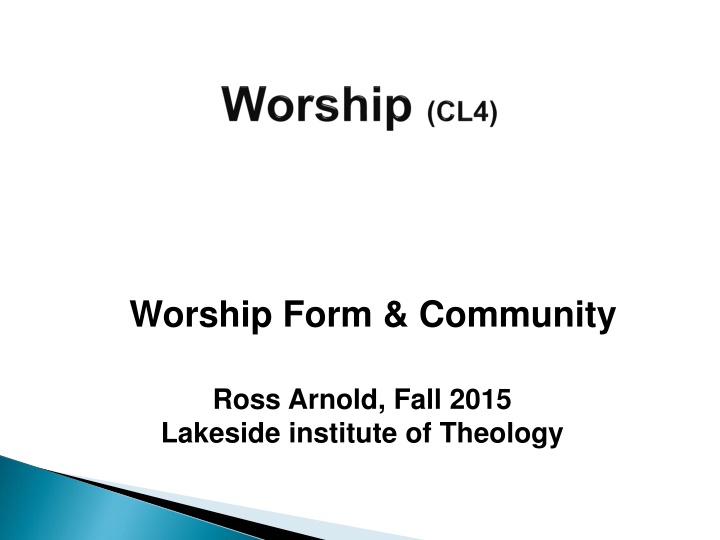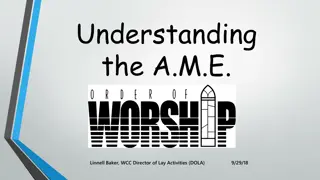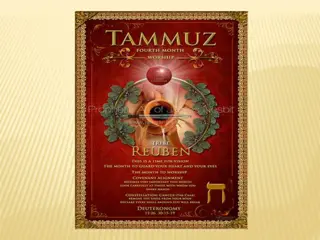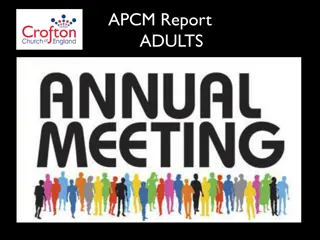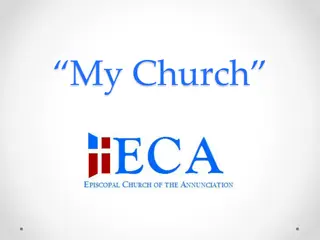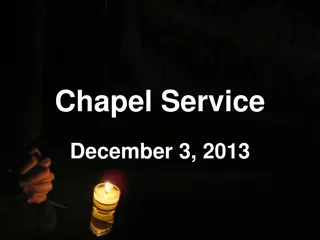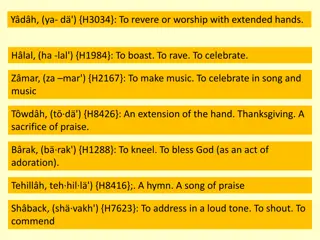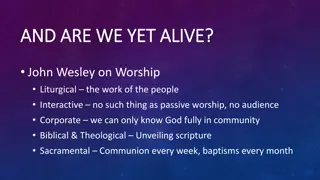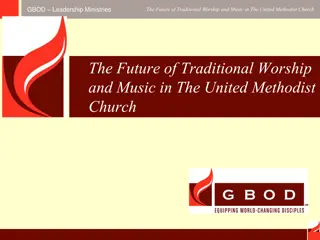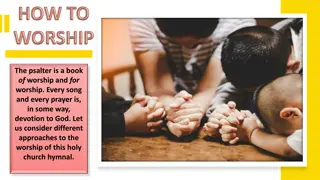Worship Form & Community
Worship is a core aspect of Christian faith, reflecting the relationship between theological beliefs and practical expressions. Explore the significance of worship practices, how they shape our beliefs, and why different styles of worship exist in various cultural contexts.
Uploaded on Feb 15, 2025 | 0 Views
Download Presentation

Please find below an Image/Link to download the presentation.
The content on the website is provided AS IS for your information and personal use only. It may not be sold, licensed, or shared on other websites without obtaining consent from the author.If you encounter any issues during the download, it is possible that the publisher has removed the file from their server.
You are allowed to download the files provided on this website for personal or commercial use, subject to the condition that they are used lawfully. All files are the property of their respective owners.
The content on the website is provided AS IS for your information and personal use only. It may not be sold, licensed, or shared on other websites without obtaining consent from the author.
E N D
Presentation Transcript
Worship Form & Community Ross Arnold, Fall 2015 Lakeside institute of Theology
Worship (CM5) Oct. 1 Intro to Christian Worship Oct. 8 Biblical & Theological Understanding Oct. 15 Mid-Term Break Oct. 22 Inviting God to Church Oct. 29 Worship Form & Community Nov. 5 Liturgy & Biblical Worship Nov. 12 Worship and the Sacraments Nov. 19 Conclusion; Final Exam
The Importance of Worship Practices Worship necessarily involves both theological content and practical form. The elements of worship reflects the relation between theological content and practical form between theology and practices. There is an ancient conviction of the church that worship is "primary theology it is where our theology begins. Formal theological language is properly a secondary reflection, and always builds on the language of worship and prayer. Therefore a person's prayer may be a better indicator of her beliefs than her explicit statements of faith. A person's practice of prayer reflects his or her theological convictions, as prayer indicates not what people say they believe but what they actually do believe - and believe in such a way as to act on it toward God. (Lex orandi, lex credendi)
Worship Today While worship is said to be experiencing a renewal in many parts of the church, there are cultural currents that seem to be working against any sustained renewal of worship, even among serious Christians. The ever-increasing power of the media and entertainment industries. A modern love for spirituality, but mistrust of religion and worship, while it expresses spirituality, is necessarily embodied in religious forms. While worship calls forth deep feelings, it is finally not an individual quest for an encounter with God or the spiritual. Worship orients itself around particular things that God has done in history, and it is primarily about things that Christians do together in the presence of God.
What, Then, is Worship? As Christians, we believe worship is: 1. a set of culturally embedded and corporate practices, 2. through which God forms us into the likeness of Christ, 3. in and through the story of Jesus Christ, 4. by the power of the Holy Spirit, in order that 5. we might live our lives to the glory of God.
Significance of Varying Styles of Worship There are many reasons for differences in worship styles (or styles of spirituality ), but one of the most important is the impact of particular cultural and historical situations. Puritan New England the clearest incarnation of Reformation worship in the New World, focused on hearing God s Word. Free Church Style introduced by Anabaptists, a radical change in understanding of church worship, focused on personal faith. Revivalism particularly American church style in which all liturgical elements tended to focus on prompting conversions. Christian Nurture Movement a reaction against revivalism, which advocated bringing young people up in the faith rather than encouraging a crisis of conversion later on in life. Pentecostalism most influential worship style in 20th century, combining freedom of lay-led worship, call to decision, and expressions of the presence of the Holy Spirit.
Varying Styles of Worship New England Puritan Worship Blessing, Hymn, Scripture, Sermon, Prayer; Communion (occasionally), Hymn, Blessing. Mainline ( Free Church ) Protestant Worship Call to Worship/Confession, Hymn, Creed/Scripture, Sermon, Prayer, Communion, Hymn, Blessing/Sending Revivalist Style Worship Prayer, Praise (Congregational singing), Testimony, Sermon, Invitation ( Harvest of Souls ) 20th Century Seeker Services Welcome and Prayer, Praise time ( worship with chorus singing), Presentation (drama, media clip), Sermon, Invitation (to Christ, or to get involved in life of the church) Pentecostalism (3rd Wave) Invitation (call to worship); Engagement (approach to God); Exaltation (God s transcendence); Adoration (God s immanence); Intimacy (rest in God s presence)
The Contemporary Situation Two major 20th century historical factors have greatly influenced contemporary approaches to worship. Liturgical Renewal in the Catholic Church, which in turn led to renewal and rediscovery by Protestants of historic spiritual traditions. Revival of Evangelical Christianity after World War II, calling for fundamentalist Christianity to greater engagement with the broader culture.
The Contemporary Situation Broadly speaking, by the end of the 20th century, contemporary worship had developed into three streams or styles: 1. Those who make the strongest attempt to connect with the culture around them, and so are most distant from more historic worship patterns. (More music-oriented) 2. Those who stand out as most distinct from and influence from contemporary culture, and so are closest to historic worship patterns. (More Eucharist or table-oriented.) 3. Those in the center, who both have an interest in preserving ancient patterns of worship, but also seek to be obedient in helping transform culture. (More Word- oriented.)
What is Worship? Christian worship is response to the Divine call, to the mighty deeds of God, culminating in the redemptive act of Christ. Christian worship is primarily and essentially an act of praise and adoration, which also implies a thankful acknowledgement of God s embracing love and redemptive loving-kindness. Worship is for the glory of God and the sanctification and edification of the faithful. Worship is not a human invention; rather it is a divine offering. God offers himself in a personal relationship, and we respond God s offer of love elicits our response in worship. Worship is the offering of our total selves to God our intellects, our feelings, our attitudes and our possessions. Pope Pius X Franklin M. Segler
Worship corporate worship, both Biblically and through the Church s history, is about remembrance and anticipation. Content there has been a crisis of content in the modern worship movement, because it is disembodied; it is de- historicized; and it is individualized. Structure The story of God is communicated in the narrative of Word and Table, which is deeply rooted in God s narrative to us. The Word read and preached remembers God s story through the Christ event; while Eucharistic prayers, songs, and symbols usher us into anticipation of the future kingdom of God. (Robert Webber) Style music is where corporate worship is contextualized, and may be viewed as a cultural language. Congregational worship must be translated into those languages.
What in the most practical terms possible is worship? What does it mean to glorify God? Ascribe to the LORD the glory due his name; bring an offering and come into his courts. 9Worship the LORD in the splendor of hisholiness; tremble before him, all the earth. What does it mean to praise God? I bowed down and worshiped the Lord . I praised the Lord, the God of my master Abraham, who had led me on the right road What does it mean to exalt God? Exalt the LORD our God and worship at his footstool; he is holy. Psalm 96:8-9 Genesis 24:48 Psalm 99:5
WHY should we worship? Shout for joy to the LORD , all the earth. 2 Worship the LORD with gladness; come before him with joyful songs. 3 Know that the LORD is God. It is he who made us, and we are his; we are his people, the sheep of his pasture. Psalm100:1-3 Does it matter WHERE we worship? And the king bowed in worship on his bed 48and said, Praise be to the LORD, the God of Israel . I Kings 1:47-48 Are there specific actions that should be part of worship? There was also a prophet, Anna, the daughter of Penuel, of the tribe of Asher. She was very old; she had lived with her husband seven years after her marriage, 37 and then was a widow until she was eighty-four.She never left the temple but worshiped night and day, fasting and praying. Luke 2:36-38
What constitutes false worship? You hypocrites! Isaiah was right when he prophesied about you: 8 These people honor me with their lips, but their hearts are far from me. 9They worship me in vain; their teachings are merely human rules. Does worship require us to bow down, or at least kneel? Jehoshaphat bowed down with his face to the ground, and all the people of Judah and Jerusalem fell down in worship before the LORD. Does true worship require sacrifice? Therefore, I urge you, brothers and sisters, in view of God s mercy, to offer your bodies as a living sacrifice, holy and pleasing to God this is your true and proper worship. Matthew 15:7-9 2 Chronicles 20:18 Romans 12:1-2
What does it mean to worship in Spirit and in truth? Yet a time is coming and has now come when the true worshipers will worship the Father in the Spirit and in truth, for they are the kind of worshipers the Father seeks. 24 God is spirit, and his worshipers must worship in the Spirit and in truth. John 4:23-24 The Israelites continually worshiped false gods and idols do we do the same? You shall not make for yourself an image in the form of anything in heaven above or on the earth beneath or in the waters below. 5 You shall not bow down to them or worship them; for I, the LORDyour God, am a jealous God Exodus 20:4-5
The Israelites were ordered to kill all those who worshiped false gods? What should we do with idolaters? If your very own brother, or your son or daughter, or the wife you love, or your closest friend secretly entices you, saying, Let us go and worship other gods (gods that neither you nor your ancestors have known, 7 gods of the peoples around you, whether near or far, from one end of the land to the other), 8 do not yield to them or listen to them. Show them no pity. Do not spare them or shield them. 9 You must certainly put them to death. Your hand must be the first in putting them to death, and then the hands of all the people. 10 Stone them to death, because they tried to turn you away from the LORD your God, who brought you out of Egypt, out of the land of slavery. 11 Then all Israel will hear and be afraid, and no one among you will do such an evil thing again. Deuteronomy 13:6-11
Worship corporate worship, both Biblically and through the Church s history, is about remembrance and anticipation. Content there has been a crisis of content in the modern worship movement, because it is disembodied; it is de- historicized; and it is individualized. Structure The story of God is communicated in the narrative of Word and Table, which is deeply rooted in God s narrative to us. The Word read and preached remembers God s story through the Christ event; while Eucharistic prayers, songs, and symbols usher us into anticipation of the future kingdom of God. (Robert Webber) Style music is where corporate worship is contextualized, and may be viewed as a cultural language. Congregational worship must be translated into those languages.
What Proper Worship Must Be 1. Christ-centered. In contrast with being audience-driven. Worship (including congregational music) must not be shaped around the congregation but around Christ. This means the content of the songs point to Christ; it means the sermon ends not with a call to try harder or do better, but to behold Christ as our Great Redeemer. 2. Gospel-shaped. Worship must orient people around the Scripture and around the Sacrament Word and Table. Instead, many church services are structured like a variety-show. 3. Spirit-filled. Not in the Pentecostal tradition so much as the miracle of Pentecost itself: when the Spirit empowered the apostles to proclaim the Gospel in the language of various peoples so that they understood it and were convicted by it.
